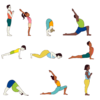Are you tired of carrying around those extra pounds and ready to embark on a weight loss journey? Achieving your weight loss goals is not just about looking better; it’s about feeling healthier and more confident. However, weight loss can be a complex and challenging process, and the internet is flooded with conflicting advice. In this comprehensive guide, we’ll provide you with science-based strategies to help you shed those unwanted pounds and maintain a healthier lifestyle.
Understanding the Science of Weight Loss
- Calories In vs. Calories Out: Weight loss is fundamentally a matter of calorie balance. When you consume more calories than your body burns, the excess is stored as fat. To lose weight, you must create a calorie deficit by consuming fewer calories than you burn through daily activities and exercise.
- Basal Metabolic Rate (BMR): Your BMR represents the number of calories your body needs to maintain basic functions, such as breathing and digestion, at rest. Understanding your BMR helps in determining your daily calorie requirements.
- Role of Hormones: Hormones like insulin, leptin, and ghrelin play a significant role in regulating your metabolism and appetite. Insulin controls blood sugar and fat storage, while leptin and ghrelin influence hunger and satiety.
- Body Composition: It’s important to recognize that your weight consists of both fat and lean muscle mass. While losing fat is a primary goal, preserving and building lean muscle is equally crucial, as muscle burns more calories than fat at rest.
weight loss tips and tricks

-
Setting Realistic Weight Loss Goals
- Goal Setting Strategies: To set effective weight loss goals, make them Specific (clear and defined), Measurable (quantifiable), Achievable (realistic), Relevant (meaningful to you), and Time-bound (with a deadline).
- Patience is Key: Understand that sustainable weight loss is a gradual process. Rapid, extreme diets often result in muscle loss and may lead to long-term weight regain. Be patient with your progress.
- Tracking Progress: Tools like food journals, fitness apps, and regular weigh-ins can help you keep track of your progress. This tracking is essential for making necessary adjustments to your plan.
-
Nutrition for Weight Loss
- Balanced Nutrition: A balanced diet should include carbohydrates, proteins, and healthy fats. Carbs provide energy, proteins support muscle maintenance, and healthy fats are essential for overall health.
- Caloric Deficit: Create a sustainable calorie deficit by consuming slightly fewer calories than your daily maintenance needs. Aim for gradual, steady weight loss rather than crash diets.
- Meal Planning: Plan your meals to include nutrient-dense foods like lean proteins, vegetables, whole grains, and fruits. This will help you stay full and satisfied while keeping calorie intake in check.
- Portion Control: Practice portion control to avoid overeating. Smaller, well-balanced meals can help regulate calorie intake and support weight loss.
- Physical Activity and Exercise
- Cardio vs. Strength Training: Incorporate a combination of cardiovascular exercises (like running or cycling) and strength training (using weights or resistance bands). Cardio burns calories, while strength training builds lean muscle, boosting your metabolism.
- Workout Routines: Design workout routines that suit your fitness level and preferences. Whether you’re a beginner or an advanced athlete, there are effective exercise plans for everyone.
- Consistency is Key: Regular exercise is crucial for weight loss and overall health. Find an exercise routine that you enjoy and can sustain over the long term.
- Healthy Lifestyle Habits
- Sleep and Stress Management: Prioritize quality sleep (7-9 hours per night) and practice stress-reduction techniques like meditation and mindfulness. Both sleep and stress significantly impact your weight.
- Hydration: Drinking adequate water helps control your appetite and supports various bodily functions, making it easier to manage your weight.
- Mindful Eating: Pay attention to your eating habits. Avoid mindless snacking and emotional eating by being present and conscious of what you eat.
weight loss myths
- Spot Reduction is a Myth: You can’t target fat loss from specific areas of your body. Weight loss results in overall fat reduction.
- Avoid Detox and Fad Diets: Extreme and restrictive diets are often ineffective and can lead to nutrient deficiencies. Sustainable, balanced eating is key to long-term success.
- Be Cautious with Supplements: Weight loss supplements are not a magic solution. Many are unproven or unsafe, so consult a healthcare professional before using them.
Overcoming Weight Loss Challenges
- Review Your Plan: Periodically reevaluate your diet and exercise regimen. As you lose weight, your calorie needs may change, so adjust your plan accordingly.
- Change Up Workouts: Introduce variety into your exercise routine to challenge your muscles and overcome plateaus. Try new activities or increase the intensity of your workouts.
- Stay Motivated: Maintain motivation by setting new goals, celebrating your achievements, and seeking support from friends, family, or a fitness community.
Seeking Professional Guidance
- Consult Nutritionists and Dietitians: Registered dietitians can help create personalized diet plans, ensuring you get the right balance of nutrients.
- Consider Personal Trainers: Personal trainers can design workout routines tailored to your goals, provide guidance, and keep you accountable.
- Medical Support When Needed: In extreme cases or when health conditions are involved, consult with healthcare professionals, including physicians and therapists.
Maintaining Your Weight Loss
- Long-Term Sustainability: Focus on making lifestyle changes that you can maintain indefinitely rather than relying on short-term diets.
- Lifestyle Over Diet: Shift your perspective from temporary diets to lifelong, healthier habits. This approach promotes weight maintenance.
- Build a Support System: Having a support network of friends, family, or weight loss groups can help you stay accountable and motivated.
homemade drinks to lose weight fast
- Lemon Water:
Start your day with a refreshing glass of lemon water. It boosts metabolism and helps burn fat. - Green Tea :
Sip on green tea infused with ginger and mint. It’s packed with antioxidants and aids digestion, promoting weight loss. - Cucumber Mint :
Blend cucumber and mint for a hydrating drink that’s low in calories, promoting a feeling of fullness. - Apple Cider Vinegar :
Mix a tablespoon of apple cider vinegar with water. It can help control blood sugar levels and reduce cravings. - Ginger Honey Tea:
Warm ginger tea with a touch of honey helps in digestion and curbs appetite, supporting weight loss efforts. - Detox Water with Berries:
Infuse water with berries for a tasty detox. Berries are rich in antioxidants and can boost metabolism. - Coconut Water Smoothie:
Blend coconut water with fruits like pineapple and spinach. It’s a nutrient-packed, low-calorie smoothie for weight loss. - Remember to pair these drinks with a balanced diet and regular exercise for effective weight loss results.
water fasting for weight loss
- In the pursuit of shedding those extra pounds, water fasting has gained popularity as a natural and simple approach. Here’s a breakdown of this weight-loss method:
- What is Water Fasting?
- Water fasting involves abstaining from all foods and beverages except water for a set period. It’s a form of intermittent fasting that gives your digestive system a break.
- How Does it Aid Weight Loss?
- During water fasting, your body taps into stored fat for energy since there’s no intake of calories. This can lead to weight loss, but it’s crucial to maintain a balanced approach.
- Benefits of Water Fasting:
- Metabolic Boost: Fasting may enhance metabolic function, potentially aiding in weight loss.
- Detoxification: It allows your body to detox by eliminating toxins through urine and sweat.
- Improved Insulin Sensitivity: Fasting may enhance insulin sensitivity, helping regulate blood sugar levels.
-
Duration Matters:
- Short-term water fasting, usually 24-72 hours, is generally considered safe for most people. Longer fasts should be approached with caution and preferably under supervision.
- Potential Risks:
- Extended water fasting may lead to nutrient deficiencies, muscle loss, and other health issues. Consult with a healthcare professional before attempting prolonged fasts.
- Listen to Your Body:
- Pay attention to how your body responds during a water fast. If you experience dizziness, weakness, or severe discomfort, it’s crucial to break the fast and nourish your body.
- Breaking the Fast:
- When ending a water fast, introduce food gradually with easily digestible items like fruits and vegetables to avoid overwhelming your digestive system.
- What is Water Fasting?
- Water fasting can be a tool for weight loss, but it’s essential to approach it mindfully. Consultation with a healthcare professional is advised, and always listen to your body signals throughout the process. As with any weight loss method, sustainable habits like a balanced diet and regular exercise are key to long-term success.
In conclusion, sustainable weight loss involves a combination of understanding the science behind it, setting realistic goals, maintaining a balanced diet, incorporating regular exercise, adopting healthy lifestyle habits, and addressing common misconceptions. By following these guidelines and staying committed, you can achieve your weight loss goals and maintain a healthier and happier lifestyle.
Some frequently asked questions

- how to lose weight fast in 2 weeks 10 kg
- Losing weight quickly, like shedding 10 kg in two weeks, can have both pros and cons. Here’s a breakdown:
- Pros:
- Quick Results: Rapid weight loss can provide a visible change in a short time, boosting motivation.
- Increased Confidence: Fast weight loss may boost self-esteem and confidence.
- Initial Water Weight Loss: The first few pounds lost may include water weight, reducing bloating.
- Kickstart to a Healthier Lifestyle: Fast results can serve as a jumpstart to adopting healthier habits like better eating and increased physical activity.
- Health Benefits: Rapid weight loss may lead to improvements in certain health markers, like blood pressure and blood sugar.
- Temporary Results: Rapid weight loss is often temporary, and the lost weight may be quickly regained.
- Cons:
- Muscle Loss: Rapid weight loss often involves muscle loss, which is not ideal for long-term health and metabolism.
- Nutrient Deficiency: Extreme diets may lack essential nutrients, leading to deficiencies and potential health issues.
- Metabolic Slowdown: Drastic calorie reduction can slow down metabolism, making it harder to maintain weight loss.
- Fatigue and Weakness: Very low-calorie diets can result in fatigue, weakness, and a lack of energy for daily activities.
- Rebound Weight Gain: Quick fixes are often temporary. Rapid weight loss may lead to rebound weight gain when normal eating patterns resume.
- Risk of Health Issues: Extreme methods can lead to health issues like dehydration, electrolyte imbalance, or gallstones.
-
Tips for a Safer Approach:
- Consult a Professional: Seek advice from a healthcare professional or nutritionist before embarking on such rapid weight loss journeys.
- Balanced Diet: Focus on a balanced diet with a mix of nutrients, including proteins, carbohydrates, and fats.
- Hydration: Drink plenty of water to stay hydrated, especially important when losing water weight.
- Regular Exercise: Include regular physical activity to preserve muscle mass and boost overall well-being.
- Realistic Goals: Set realistic and sustainable weight loss goals for long-term success.
- Remember, sustainable weight loss is a gradual process that involves making healthy lifestyle choices rather than opting for drastic measures that may have adverse effects on your health.
- how to lose weight fast in 2 weeks
- for this question you can refer above answere.
- how to lose weight fast with exercise
- “I believe that by reading our blog, you have already found the answer you’re looking for.”
-
how to lose weight fast without exercise
- Mindful Eating Habits:
Pay attention to what and how much you eat. Slow down, savor each bite, and listen to your body’s hunger and fullness cues. This simple shift can prevent overeating and aid weight loss. - Balanced and Nutrient-Rich Diet:
Opt for a well-balanced diet that includes whole foods like fruits, vegetables, lean proteins, and whole grains. Focus on nutrient density to satisfy your body’s needs without excess calories. - Portion Control:
Be mindful of portion sizes. Use smaller plates to help control portions, and avoid going back for seconds. This approach can naturally reduce calorie intake without the need for intense exercise. - Hydration is Key:
Drink plenty of water throughout the day. Sometimes, our bodies confuse thirst with hunger. Staying hydrated can help curb unnecessary snacking and support overall health. - Adequate Sleep:
Ensure you get enough quality sleep each night. Lack of sleep can disrupt your metabolism and increase cravings for unhealthy foods. Aim for 7-9 hours of sleep to support weight loss efforts.
- Mindful Eating Habits:
-
i need to lose weight fast i don’t care how
- It’s totally understandable to want quick results when it comes to weight loss, but it’s crucial to prioritize your health. Instead of opting for extreme measures, focus on sustainable changes that can make a lasting impact. Start by incorporating more fruits, vegetables, and whole grains into your diet. Cut down on sugary snacks and drinks. Drink plenty of water and engage in regular physical activity, even if it’s just a brisk walk every day. Quick fixes may provide temporary results, but a gradual and healthier approach will lead to long-term success. Remember, it’s about making lifestyle changes that you can maintain, not just a rapid solution. Consult with a healthcare professional or a nutritionist for personalized advice on achieving your weight loss goals in a healthy and sustainable way. For more read whole blog.
-
how to lose weight fast with exercise at home
- Simple Home Exercises for Fast Weight Loss:
- Losing weight at home can be both effective and enjoyable. Here’s a simple guide to help you shed those extra pounds:
- Jump Rope Fun:
Grab a jump rope and skip your way to fitness. It’s a great cardio exercise that burns calories and tones your entire body. - Dance It Out:
Turn up the music and dance like nobody’s watching. Dancing is a joyful way to burn calories and improve your mood. - Bodyweight Workouts:
Use your own body as resistance. Squats, lunges, and push-ups are excellent for building strength and burning fat. - Stair Climbing:
If you have stairs at home, use them to your advantage. Climbing stairs is a fantastic lower body workout that also gets your heart pumping. - High-Intensity Interval Training (HIIT):
Incorporate short bursts of intense exercise followed by brief rest periods. This boosts metabolism and continues to burn calories even after you’ve finished your workout. - Yoga for Balance:
Practice yoga for flexibility, balance, and relaxation. It may not feel intense, but it contributes to overall well-being and weight loss. - Hiking at Home:
If the weather is nice, take a brisk walk or jog around your backyard or in a nearby park. Fresh air and movement make a winning combination. - Chair Exercises:
Don’t underestimate the power of a sturdy chair. Use it for squats, tricep dips, and leg lifts to target different muscle groups.
- Remember, consistency is key. Aim for at least 30 minutes of exercise most days of the week, and combine it with a balanced diet for the best results. Always consult with a healthcare professional before starting a new exercise routine.
- Simple Home Exercises for Fast Weight Loss:







